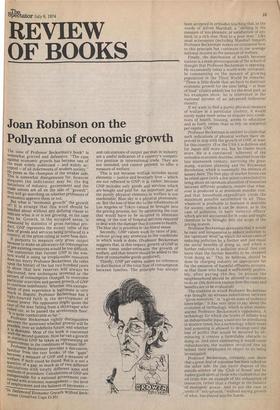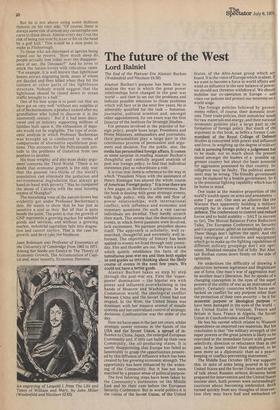REVIEW OF BOOKS
Joan Robinson on the Pollyanna of economic growth
The tone of Professor Beckerman's book* is somewhat grieved and defensive. "The case against economic growth has become one of the most widely publicised — and widely accepted — of all indictments of modern society." He poses as the champion of the weaker side. This is somewhat disingenuous for, however eloquent the indictment may be, the big battalions of industry, government and the trade unions are all on the side of "growth"; they will go marching on whether professors of economics approve them or not.
But what is "economic growth" the growth of? It is strange that this word should be bandied about without any defining clause to indicate what is or is not growing, as the case may be. Growth, in the accepted sense, is Measured by statistics of gross national product. GNP represents the money value of the flow of goods and services being produced in a country, at the prices ruling at some base date.
It purports to. measure only gross output because to make an allowance for consumption of pre-existing resources would be too difficult. The contention that current GNP in the western world is using up irreplaceable resources does not worry Professor Beckerman. He relies upon the history of the last two hundred years to show that new reserves will always be discovered, new techniques invented or the Pattern of consumption changed, to overcome Particular scarcities and permit growth of GNP to continue indefinitely. Whether this extrapolation of past experience is legitimate is very much in dispute. Professor Beckerman has a light-hearted faith in the development of atomic power. His opponents might quote the case of the man falling from a skyscraper who called out, as he passed the seventeenth floor: It is quite comfortable so far." Professor Beckerman rightly distinguishes between the questions whether growth will be possible, over an indefinite future, and whether tv,t, .is desirable. Most of the book is concerned lth the second question. How far can a growth .n statistical GNP be taken as representing an IMprovement in the conditions of human life? Professor Beckerrnan provides a discussion, between from the text books, of the "gaps" oetween a measure of GNP and a measure of welfare, if such could be found. But it is not a question of a gap, so much as of two different calculations with totally different aims and methods of procedure. Calculations of GNP are Indispensable for a national government concerned with economic management — the level emPloyment and the balance of payments
L'efenceof Economic Growth Wilfred Beckerman (Jonathan Cape E3.95) and calculations of output per man in industry are a useful indication of a country's competitive position in international trade. They are not intended, and cannot pretend, to offer a measure of welfare.
This is not because welfare includes moral elements — justice and brotherly love — which are not reflected in GNP.. It is, rather, because GNP includes only goods and services which are bought and paid for. An important part of the purely physical elements in welfare is not marketable. Blue sky is a physical phenomenon. But the loss of blue sky to the inhabitants of Los Angeles or Tokyo cannot be brought into the pricing process, say, by estimating the cost that would have to be incurred to eliminate smog, or the cost of hospital services required to deal with the damage that it causes to health. The blue sky is priceless in the literal sense. Secondly, GNP values work by rates of Pay, without giving any attention to the conditions in which work is done. (Professor Beckerman suggests that, in this respect, growth of GNP in recent times under-estimates the growth of welfare, and that leisure should be added to the flow of consumable goods produced). Thirdly, GNP per capita makes no reference to distribution of the total flow of consumption between families. The principle has always been accepted in orthodox teaching that, in the words of Alfred Marshall, a "shilling is the measure of less pleasure, or satisfaction of any kind, to a rich man than to a poor man." Like most economists (including Marshall himself) Professor Beckerman makes an occasional bow to this principle but continues to use average national income as the measure of welfare.
Finally, the distribution of wealth between nations is a main preoccupation of the school of thought that Professor Beckerman is opposing. He occasionally takes a world-wide viewpoint. In commenting on the menace of growing population in the Third World he remarks: "There is little doubt that we have to maintain economic growth for the time being — at least of food" (italics added) but for the most part, as his examples show, he is interested in the national income of an advanced industrial country.
If we want to find a purely physical measure of welfare in a particular country, it would surely make more sense to enquire into conditions of health, housing, access to education and so forth, rather than to rely on statistical per capita GNP. Professor Beckerman is entitled to claim that such indications of physical welfare have improved in step with the growth of GNP, at least for this country. (For the USA it is dubious and for Japan still more so). But he claims much more. He is a convinced adherent of the orthodox economic doctrine, inherited from the late nineteenth century, surviving the great . slump, wartime planning and the Keynesian Revolution, which is essentially the defence of laissez faire. The free play of market forces can be relied upon (with a few minor corrections) to bring about an optimum allocation of resources between different products, ensure that whatever is produced is at minimum possible cost, and that household expenditure yields the maximum possible satisfaction to all. Thus, whatever is profitable to business is desirable for society, unless it can be shown, as in the case of pollution, to have 'external effects' which are not accounted for in costs and'ought therefore to be brought into the scope of the pricing system. Professor Beckerman maintains that it would be easy and inexpensive to reduce pollution to the 'optimum' level "at which the social costs of reducing pollution by a further unit just equal the social benefits of doing so, and where a further reduction in pollution would then cost more than the further benefits to be obtained from doing so." This, he believes, should be done by charging industry an appropriate fee for the emission of harmful effluents etcetera, so that those who found it sufficiently profitable, after paying the fee, to poison the neighbourhood should be allowed to continue to do so. (He does not explain how the costs and benefits are to be evaluated).
The tradition in which Professor Beckerman was brought up stresses substitution between "given resources," in "a given state of technical knowledge." It has very little to say about the evolution of technology, which is what mainly alarms Professor Beckerman's opponents. A technology for which the brains of infants was an indispensable input would not be introduced in modern timeS, but a technology which emits lead poisoning is allowed to develop until the loss of profits that would be incurred by eliminating it creates a formidable obstacle to doing so. And since eliminating it would cause redundancies, the workers involved line up behind their employers to object to its being investigated.
Professor Beckerman, certainly, can show that a great deal of nonsense has been talked on the other side. He can easily dispose of the pseudo-science of the 'Club of Rome' and he makes good sport of those who claimed that the . oil crisis was an example of the exhaustion of resources, rather than a change in the balance of monopoly power. And to put the case in terms of "anti-growth," without saying growth of what, has played into his hands. But he is not above using some dubious rhetoric on his own side. "Of course, there is always some risk of almost any catastrophe one cares to think about. Almost every day I run the risk of being run over by a car or hit on the head by a golf ball." This would be a nice point to make at Flixborough.
To those who are distressed at species being wiped out he retorts: "How much sleep do people, actually lose today over the disappearance of say, the Dinosaur?" And he loves to mock the nature-lovers with ridiculous cases: "For example, it is well known that lighthouse beams attract migrating birds, many of whom are dazzled and then killed when they hit the lantern or other parts of the lighthouse structure. Nobody would suggest that the lighthouse should be closed down or ocean traffic brought to a half."
One of his best quips is to point out that we have got on very well "without any supplies at all of Beckermonium, a product named after my grandfather who failed to discover it in the nineteenth century." But if it had been discovered and an industry supporting millions of families built upon it, the exhaustion of deposits would not be negligible. The type of economic analysis in which Professor Beckerman was brought up is conducted in terms of comparisons of alternative equilibrium positions. This accounts for his Pollyannaish attitude to the problems of transition from one position to another.
His most weighty and also most shaky argument concerns the Third World. "There is no doubt that economic growth is the only way that the poorest two-thirds of the world's population can eliminate the pollution and environmental degradation that always go hand-in-hand with poverty." Has he compared the slums of Calcutta with the neat housing estates of Shanghai?
The moralising tone of the nature-lovers has evidently got under Professor Beckerman's skin. He wants to show that he has just as. sensitive a soul as they. But all that is quite beside the point. The point is that the growth of GNP represents a growing market for saleable goods and services, and without a growing market, industrial capitalism falls into stagnation and cannot survive. That is the case for growth, and devil take the hindmost.
Joan Robinson was Professor of Economics at the University of Cambridge from 1965 to 1971. Among her books are Essays in The Theory of Economic Growth, The Accumulation of Capital and, most recently, Economic Heresies.



































 Previous page
Previous page